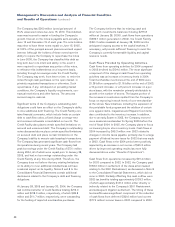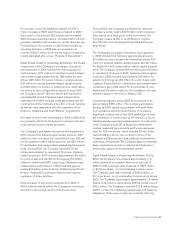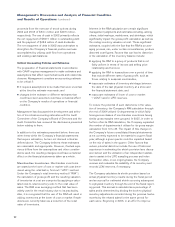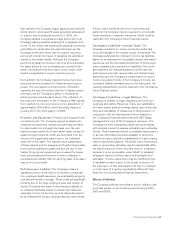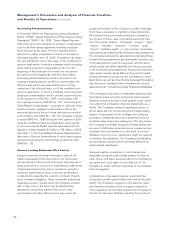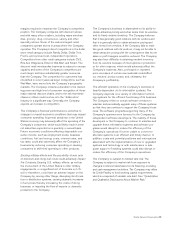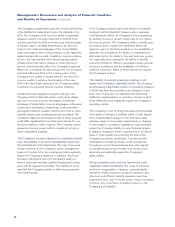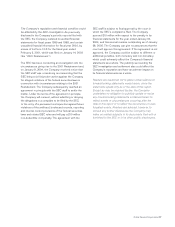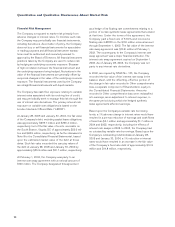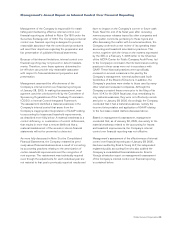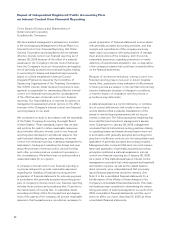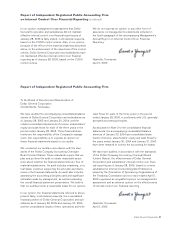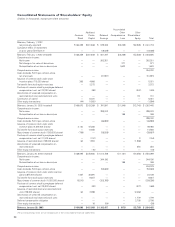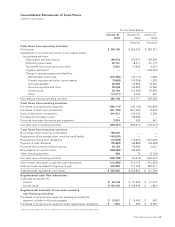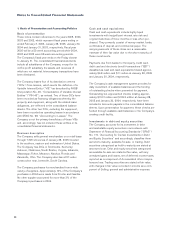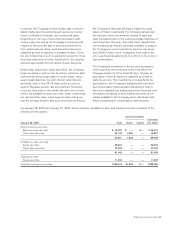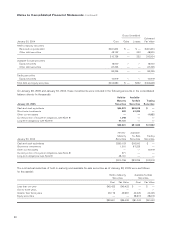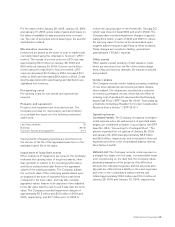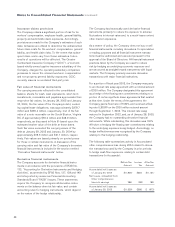Dollar General 2004 Annual Report Download - page 32
Download and view the complete annual report
Please find page 32 of the 2004 Dollar General annual report below. You can navigate through the pages in the report by either clicking on the pages listed below, or by using the keyword search tool below to find specific information within the annual report.30
To the Board of Directors and Shareholders of
Dollar General Corporation
Goodlettsville, Tennessee
We have audited management’s assessment, included
in the accompanying Management’s Annual Report on
Internal Control Over Financial Reporting, that Dollar
General Corporation and subsidiaries did not maintain
effective internal control over financial reporting as of
January 28, 2005 because of the effect of a material
weakness in the Company’s internal control that arose
from the Company’s incorrect interpretation and applica-
tion of generally accepted accounting principles relating
to accounting for leases and leasehold improvements,
based on criteria established in Internal Control-
Integrated Framework issued by the Committee of
Sponsoring Organizations of the Treadway Commission
(the COSO criteria). Dollar General Corporation’s man-
agement is responsible for maintaining effective internal
control over financial reporting and for its assessment
of the effectiveness of internal control over financial
reporting. Our responsibility is to express an opinion on
management’s assessment and an opinion on the effec-
tiveness of the Company’s internal control over financial
reporting based on our audit.
We conducted our audit in accordance with the standards
of the Public Company Accounting Oversight Board
(United States). Those standards require that we plan
and perform the audit to obtain reasonable assurance
about whether effective internal control over financial
reporting was maintained in all material respects. Our
audit included obtaining an understanding of internal
control over financial reporting, evaluating management’s
assessment, testing and evaluating the design and oper-
ating effectiveness of internal control, and performing
such other procedures as we considered necessary in
the circumstances. We believe that our audit provides a
reasonable basis for our opinion.
A company’s internal control over financial reporting is
a process designed to provide reasonable assurance
regarding the reliability of financial reporting and the
preparation of financial statements for external purposes
in accordance with generally accepted accounting princi-
ples. A company’s internal control over financial reporting
includes those policies and procedures that (1) pertain to
the maintenance of records that, in reasonable detail,
accurately and fairly reflect the transactions and disposi-
tions of the assets of the company; (2) provide reasonable
assurance that transactions are recorded as necessary to
permit preparation of financial statements in accordance
with generally accepted accounting principles, and that
receipts and expenditures of the company are being
made only in accordance with authorizations of manage-
ment and directors of the company; and (3) provide
reasonable assurance regarding prevention or timely
detection of unauthorized acquisition, use, or disposition
of the company’s assets that could have a material effect
on the financial statements.
Because of its inherent limitations, internal control over
financial reporting may not prevent or detect misstate-
ments. Also, projections of any evaluation of effectiveness
to future periods are subject to the risk that controls may
become inadequate because of changes in conditions,
or that the degree of compliance with the policies or
procedures may deteriorate.
A material weakness is a control deficiency, or combina-
tion of control deficiencies, that results in more than a
remote likelihood that a material misstatement of the
annual or interim financial statements will not be pre-
vented or detected. The following material weakness has
been identified and included in management’s assess-
ment. Subsequent to January 28, 2005, management
concluded that its historical accounting practices relating
to operating leases and leasehold amortization were not
in accordance with generally accepted accounting princi-
ples due to ineffective controls over the interpretation and
application of generally accepted accounting principles.
Management also concluded that such incorrect interpre-
tation and application of generally accepted accounting
principles constituted a material weakness in internal
control over financial reporting as of January 28, 2005.
As a result of this material weakness in internal control,
management concluded that rental expense and leasehold
amortization expense, as well as the related balance
sheet accounts, were understated and that previously
issued financial statements should be restated. See
Note 2 to the consolidated financial statements for a
full discussion of the effects of these changes to the
Company’s consolidated financial statements. This mate-
rial weakness was considered in determining the nature,
timing and extent of audit tests applied in our audit of the
2004 consolidated financial statements, and this report
does not affect our report dated April 5, 2005 on those
consolidated financial statements.
Report of Independent Registered Public Accounting Firm
on Internal Control Over Financial Reporting


